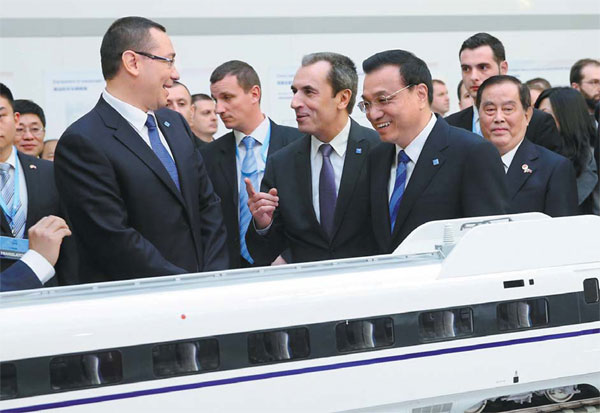Li looks to closer relations
|
Premier Li Keqiang and leaders from Central and Eastern European countries view a model of a Chinese high-speed train at an exhibition of Chinese equipment in Bucharest, the Romanian capital, on Tuesday. Yao Dawei / Xinhua |
China, Central and Eastern Europe vow to double trade in five years
China and Central and Eastern European countries have vowed to double their trade in five years and will discuss plans to build a new railway link between them.
Premier Li Keqiang said on Tuesday that closer ties with the region will enrich cooperation between China and all of Europe.
He made the remarks in an address at an economic forum between China and Central and Eastern European nations in Bucharest, the Romanian capital.
Analysts said that as the region has been forging ahead with economic development and upgrading its industry, cooperation with China will benefit both sides.
Li told officials and businesspeople that China will take measures to boost trade with the region by hosting roundtable meetings with commerce ministers, exhibiting the region's products in China and by holding agricultural and trade forums.
He also called on China and the region to work on a series of major infrastructure developments such as railways and power projects.
Analysts said the potential for trade between China and the region is huge.
In the first 10 months of the year, trade between China and Central and Eastern European countries reached $52.1 billion. The figure surpassed the $50 billion recorded in 2012, but accounted for 10 percent of trade between China and the European Union.
While Chinese investment in Central and Eastern Europe topped $800 million in 2010, compared with almost nothing in the early 2000s, the region attracted less Chinese investment than in Sweden alone, according to the Warsaw-based Central and Eastern European Development Institute.
"Further enhancing their cooperation on trade and investment is meaningful and essential for both China and Central and Eastern European countries," said Pan Zhanlin, former Chinese ambassador to the former Yugoslavia.
"Central and Eastern Europe is eager to attract more foreign investment and to increase exports to boost its economies and get over the negative impact of the international financial crisis," Pan said.
Cooperation with China can help them better diversify their sources of investment, while China's huge market brings them huge opportunities. Central and Eastern Europe will also be an important agricultural product supplier to China, Pan said.
China's urbanization will bring greater demand for beef, lamb, cheese, wines and other products.
Camelia Sucu, a Romanian businesswoman, said she invested in agriculture four years ago because of the outlook for the industry. Sucu's company, which owns about 2,000 hectares of farmland, plans to export beef to China.
She said Li's promise to import more beef and lamb from Romania has made her believe that the idea of exporting safe agricultural products to China can bring good business.
Cui Hongjian, a researcher in European studies at the China Institute of International Studies, said, "Cooperation between China and Central and Eastern Europe will inject new energy to China-Europe cooperation as a whole."
Central and Eastern Europe occupies about 1.3 million square kilometers, about one-third of the European continent. The region's population has reached 123 million.
Compared with countries elsewhere in Europe, Central and Eastern Europe has its own characteristics in economic and social development.
Cui said: "Cooperation with those countries will effectively complement China-EU cooperation. It shows a strategic coordination of the current China-EU system of cooperation.
"Cooperation with China will help Central and Eastern European countries improve the level of infrastructure construction, and therefore their connectivity with other parts of Europe."
China has accelerated its cooperation with the region in recent years, launching the Secretariat for Cooperation between China and Central and Eastern European Countries in September 2012.
A $10 billion special credit line is also operational and China has sent more than 30 trade promotion delegations to the region.



















